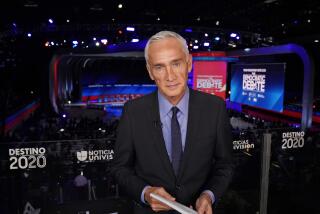Univision Makes Eleventh-Hour Push to Seal Hispanic Radio Deal
- Share via
Univision Communications Inc. didn’t see it coming.
The company had faced scattered opposition in its bid to earn federal approval of its $2.3-billion acquisition of a Dallas-based radio chain. But two months after executives predicted the merger was on the verge of being approved, the deal is still sitting on regulators’ desks, and the company is defending its commitment to Latinos.
The Los Angeles-based company has paid for full-page advertisements to run today in newspapers including the Washington Post and the New York Times. The ad features a letter from New Mexico Gov. Bill Richardson urging Democratic leaders in Congress to support Univision’s planned purchase of Hispanic Broadcasting Corp., which owns more than 60 Spanish-language radio stations.
The acquisition would allow Univision to grow into a television, radio and record label behemoth commanding two-thirds of the advertising dollars spent on Spanish-language media in the U.S.
That prospect has prompted several Democrats in Congress, including Massachusetts Sen. Edward M. Kennedy and New York Sen. Hillary Rodham Clinton, to urge Federal Communications Chairman Michael K. Powell to delay approval.
“There’s huge monopolistic concerns,” Rep. Linda Sanchez (D-Lakewood) said Tuesday. “If you have one company that controls almost all of Spanish-language television, radio and Internet portals, then I’m worried that you won’t have a diversity of viewpoints or expression.”
Univision executives counter by saying the company must be bigger to better compete against English-language media conglomerates, such as Viacom Inc. and News Corp. Although Univision controls more than 80% of the audience of Spanish-language TV, its position in the overall market is much smaller.
“Nationwide, Univision has 4.5% of the viewership and approximately 2% of the advertising dollars,” said Ray Rodriguez, president of Univision TV networks. “If we can’t compete effectively, then we can’t get more resources for more news and improved programming. This is going to help Hispanics.”
Univision hadn’t planned on mounting an eleventh-hour lobbying blitz. But in recent weeks, executives have been calling on FCC commissioners and members of Congress as well as soliciting support from Latino political groups, such as the National Council of La Raza.
“We thought we would win approval based on the merits of the deal,” said Doug Kranwinkle, Univision’s general counsel. “And we still think we should, and that we will.”
The newspaper ads running today echo sentiments published last week in an open letter from Henry Cisneros, a former Univision president who served as housing secretary under President Clinton.
The merger will not “limit the range of programming for Latinos -- it will enhance it,” Cisneros said in a recent interview. “Univision will be able to play with the big boys.”
Cisneros said he felt compelled to speak out to support Univision. Although he has no Univision stock in his name, Cisneros cashed out $10.8 million in stock when he left the company in 2000, and his son’s educational trust fund is principally Univision stock, he said.
The public lobbying became necessary, Cisneros and Univision executives say, after opponents attacked Univision’s management in advertisements that ran in the Washington Times and the Wall Street Journal.
Among other things, opponents contend that Univision is controlled by Los Angeles billionaire A. Jerrold Perenchio and a coterie of white business executives with little in common with working-class Latinos who watch Univision shows.
In one ad, the National Hispanic Policy Institute said Perenchio supported California’s Proposition 187, a 1994 voter-approved initiative aimed at preventing illegal immigrants from receiving government services.
Univision’s Rodriguez said those allegations are false, and Univision produced a copy of a $50,000 canceled check that Perenchio sent to a group that fought the initiative. Rodriguez said Univision has a strong record serving Latinos with news and entertainment.
“There’s been so much misinformation out there that we felt that we had to straighten the record,” he said, noting that he is one of three Latinos who head a Univision division. “Out of 3,300 employees now at Univision, over 80% are Hispanic.”
Analysts predict the merger soon will be approved. “Univision is still much smaller than other English-language media conglomerates,” said David Joyce, senior media analyst with the Miami-based investment banking firm Guzman & Co.
The FCC is the final regulatory hurdle. The Justice Department signed off on March 26. FCC approval has stalled, Univision executives say, because commissioners have been focused on the debate over loosening media ownership rules.
Powell said as much last week, telling Reuters that the merger “is a big issue, it’s here, but nobody has really spent any time on it.”
Times staff writer James reported from Los Angeles, Calvo from Houston.
More to Read
The biggest entertainment stories
Get our big stories about Hollywood, film, television, music, arts, culture and more right in your inbox as soon as they publish.
You may occasionally receive promotional content from the Los Angeles Times.











